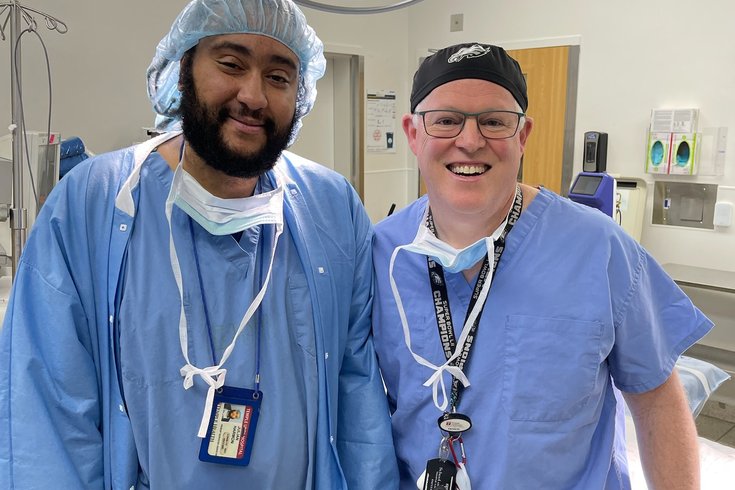
April 16, 2024
 Provided Image/Temple Health
Provided Image/Temple Health
Temple surgeon Dr. Kenneth Chavin, right, performed a kidney transplant on his colleague Julian Harmon last year. To raise awareness for organ donation, they threw out the first pitch at a Phillies game earlier in April.
Julian Harmon assists doctors, nurses and patients in the operating rooms where organ transplants are performed at Temple University Hospital.
Harmon also has lived with kidney disease for nearly a decade and was put on the kidney transplant waiting list in 2019. Of the more than 90,000 Americans waiting for a kidney, only 28,144 received one in 2023.
But every day at work, Harmon remained hopeful as he cleaned operating rooms, took specimens to labs and transported patients in and out of surgeries.
"I would even meet people who were going to get a kidney transplant," said Harmon, who works as a perioperative services assistant.
Instead of making him feel jealous or resentful, Harmon said talking to others as he wheeled them into operating rooms for transplant surgery helped him maintain hope. "I knew I wasn't alone," he said. "I always knew I would get the surgery done."
On Jan. 6, 2023, Harmon received a call at work that a kidney was available for him. Within hours, Harmon was in one of the operating rooms where he spends his days, receiving a life-saving transplant performed by Dr. Kenneth Chavin, director of Temple Health's Abdominal Organ Transplant Program, whose locker happens to sit right next to Harmon's.
"Now we've become friends," Chavin said. "He's maintaining his kidney beautifully."
Earlier in April, Harmon and Chavin threw out the first pitch at a Phillies game. Their appearance was a way to celebrate and raise awareness about kidney donation during National Donate Life Month.
Kidney disease is the fastest-growing noncommunicable disease in the United States and kills more people each year than breast or prostate cancer. About 37 million Americans are living with kidney disease, including 808,000 with kidney failure.
Black Americans are more than four times as likely to develop kidney failure than white Americans. Hispanic and Native Americans are more than twice as likely.
The shortage of available kidneys means that the majority of people living with kidney failure – which has no cure – are on dialysis while they hope for a kidney transplant. More than 556,000 people are on kidney dialysis, according to the American Kidney Fund.
Harmon eventually ended up on dialysis after being diagnosed in 2015 with IgA nephropathy, a disease in which IgA protein builds up in and damages the filtering part of the kidney. For about four years, Harmon had to do peritoneal dialysis at home for 12 hours each night. The process which required him to attach a catheter surgically placed in his abdomen to a machine that pumped cleansing fluid into his stomach and waste products from his blood.
"I would come home, make myself dinner, wash up and hook myself onto the machine," Harmon said. "Some nights would be good, and some nights I would end up lying the wrong way and all sorts of alarms would go off."
His mother and his tight group of friends kept his spirits up. "I knew I had people in my corner," Harmon said.
"I used to work through the week and by the weekend I would be exhausted," Harmon said. Often he had to rest in bed most of the weekend to regain the strength to return to work the following week.
His mother worried about him, Harmon said. "To see me from there to now – she's just ecstatic.
"When you're doing dialysis, there are a lot of things you have to sacrifice," such as a social life, said Harmon, who now has a girlfriend.
Receiving a kidney transplant is "transformational," Chavin said, noting that it allows people to "go back to normal activity."
With more research and knowledge about the immune system and medication, one-year survival rates after a kidney transplant are now about 90%, Chavin said. In the early days of transplant surgery, they were closer to 50%.
Someone who donates a kidney and then needs a transplant for whatever reason goes to the "top of the list," Chavin said, "so the system has this safety net."
Donating organs not only impacts the people who receive them, but also "their legacy, what they do in life," Chavin said.
By sharing his story, Harmon said he hopes more people will consider organ donation.
"There are a lot of people in my situation," Harmon said, "A lot of people who deserve that second chance at life."
People can register to be an organ donor when renewing their driver’s licenses or state IDs. They also can register online.